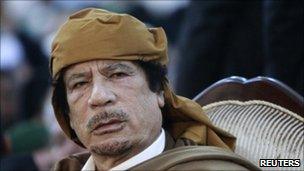Libya not immune to winds of change
- Published

Col Gaddafi is the Arab world's longest-serving ruler, after 42 years in power
The violent clashes reported from Benghazi, on Libya's north-east coast, could well be a foretaste of what is to follow.
Opponents of the regime are calling for major protests this Thursday, spreading the word by internet.
Libya has had protests before, successfully quashed by the powerful security forces. But those were before the leaders of both Libya's neighbours - Tunisia to the west, Egypt to the east - were driven from power.
There has been much speculation among young, educated Arabs, that the days of Colonel Muammar Gaddafi's regime are numbered.
He himself has been in power for 42 years, making him the Arab world's longest-serving ruler, just ahead of Oman's Sultan Qaboos.
Officially, he does not rule Libya, it is government by committee, with the country adopting various titles like The Socialist People's Libyan Arab Jamahiriya.
In practice, it is effectively a police state where political parties are banned and dissent is crushed.
Hotbed of dissent
Col Gaddafi and his family enjoy enormous power and privilege. But so too do many of those tied to the regime, including tribal leaders, and the military would think twice before turning against their patron.
Benghazi, where the protests took place, is Libya's second city and far from Col Gaddafi's power bases in Tripoli and Sirte, both geographically and politically.
It is 1,000km (600 miles) to the east and close to the Jabal Akhdar (Green Mountain) area of Cyrenaica, known as a hotbed of dissent against Col Gaddafi's rule.
It is from here that Libya's best known rebel group, the Libyan Islamic Fighting Group (LIFG), has drawn many of its members in the past. Once allied to al-Qaeda, the LIFG has since renounced its ties to Osama Bin Laden.
Ageing and erratic
Since UN sanctions were lifted following the Lockerbie trial there has been a tentative rapprochement between Libya and the West.
Libya renounced its attempts to acquire nuclear weapons, dismantled its chemical weapons programme, paid compensation to the victims of the Lockerbie bombing, and opened its doors to international tourists.
The country has some fabulous, unspoilt Roman ruins and spectacular Saharan scenery. Tony Blair visited while he was British prime minister.
With its sizable oil and gas reserves, Libya is an important market for Western oil companies and many of its citizens enjoy relative affluence.
None of this, however, makes Libya immune from the breeze of revolutionary change that is blowing across the region.
Whatever happens in the coming protests it will be increasingly difficult for the ageing and erratic Col Gaddafi to resist the calls for political freedom, civil rights, a more equitable sharing of the nation's wealth and a move towards a genuine democracy.